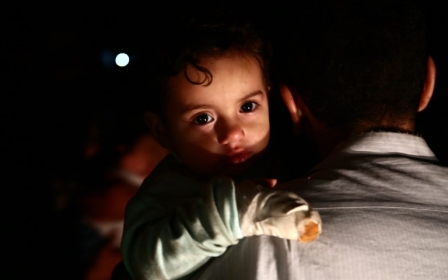US-sized hole in Syria funding puts refugees at risk, says relief agency

The United States’ failure to pledge a single dollar in aid at this week’s Syria donor conference in Brussels may imperil Syrian lives and risks destabilising neighbouring countries, an aid group warned Thursday.
The EU/UN donor conference in Brussels this raised $4.4bn in pledges - $1.6bn below the target. UN humanitarian aid chiefs said the shortfall would force officials to "prioritise" who of the estimated 13 million Syrian refugees they could help.
They’re the single biggest donor of the aid response, and that's really worrying
- Daniel Gorevan, NRC
Aid groups and the governments of countries neighbouring Syria and in Europe were dismayed that the US failed to pledge any money this week - although there is the possibility that later donations could be announced.
However, the Norwegian Refugee Council told Middle East Eye said the lack of any US input was troubling.
“They’re the single biggest donor of the aid response, and that’s really worrying,” said Daniel Gorevan, of the council.
However Gorevan said the indications were that the current freeze won’t be permanent, but could take time "particularly with how the policy process is working within the US administration at the moment".
At the 2017 Brussels conference, the US pledged $566,000 but eventually donated $1.5bn to those in need in Syria and the region – approximately the amount now needed to cover the shortfall.
"We're very concerned that either the pledges will take a long time to come through or they would be less than the US has previously pledged, and that might mean a significant shortfall on previous years.”
However, the US has not given up on Syria, despite its reluctance to pledge aid money in Brussels, according to UN Office for the Coordination of Humanitarian Affairs spokesman Jens Laerke.
"The absence of a pledge is not a failure of the US to support the Syria crisis response," he told MEE. "They chose not to make a pledge yet for internal budgetary reasons."
"The US is already the third largest donor country this year,” he added. "Historically, the US has been a top donor to the Syria response in many years."
US sympathy
Though US President Donald Trump has expressed sympathy for the plight of Syrian civilians, particularly after the chemical attacks in Khan Sheikhoun in 2017 and Douma earlier this month, his administration has instead cut back on several aid programmes for Syrians suffering from the conflict.
In March, the president ordered $200m in recovery funds to be put on hold, while State Department figures revealed earlier this month that just 11 Syrian refugees had been admitted to the country this year.
Washington is currently reviewing its Syria policy, and Trump has repeatedly questioned the effectiveness of aid the US provides, in Syria and elsewhere.
The shortfall is expected to make a significant impact on Syrian refugees and their host communities.
Mark Lowcock, UN under-secretary-general for humanitarian affairs, said at the conference’s conclusion that the lack of funding would result in “prioritisation” on the ground.
Aid workers would be forced to focus on the most needy, he said, and wider services would have to be cut back.
In effect this will put greater pressure on host communities and the governments of countries neighbouring Syria, such as in Lebanon, where an estimated 1.5 million refugees have swelled the country’s population by some 25 per cent and placed greater stress on its already creaking infrastructure.
"These could contribute to push factors for refugees to return to Syria while it is still an unsafe place for them," Gorevan said.
This year alone 700,000 Syrians have been displaced, and many more could be on their way.
The UN’s envoy to Syria Staffan de Mistura has warned that northern Idlib province, where 1.3 million of its 2 million population are displaced, could soon become Syria’s newest crisis zone.
"Idlib is the big new challenge," he said. "2.5 million people... there are women, children, civilians, and this is looming up there."
Meanwhile, Syrian government forces continue operations to take all rebel-held areas around the capital Damascus, and also have the southern region of Daraa in their sights.
Stay informed with MEE's newsletters
Sign up to get the latest alerts, insights and analysis, starting with Turkey Unpacked
Middle East Eye delivers independent and unrivalled coverage and analysis of the Middle East, North Africa and beyond. To learn more about republishing this content and the associated fees, please fill out this form. More about MEE can be found here.




